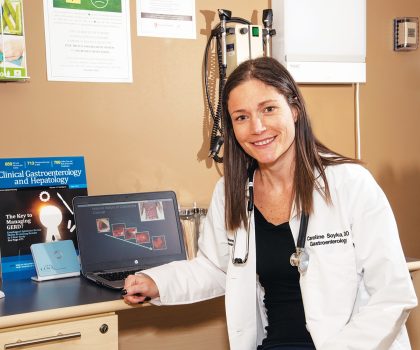Do I really need a colonoscopy?

By Ken McEntee
Yes, and here's why.
Caroline Soyka, DO, a gastroenterologist and director of endoscopy at University Hospitals Geauga Medical Center, says preventing cancer is her passion.
“Because we have the opportunity to remove pre-cancerous polyps during the screening procedure, colorectal cancer is one of the only types of cancer that is truly preventable,” Dr. Soyka says.
That’s why it’s so important to get colonoscopies done at recommended intervals—generally starting at the age of 45—or if you experience symptoms like bright red blood in your stool, changes in your bowel habits, bloating and unintentional weight loss.
During a colonoscopy, the doctor examines the inside of a patient’s colon using a small camera at the end of a flexible tube. At the same time, any polyps—or abnormal growths—that are detected can be removed, eliminating the chance that they can evolve into cancer.
“It’s very rewarding to be able to perform a simple procedure that can actually prevent a person from getting cancer,” Dr. Soyka shares.
Despite being one of the most treatable forms of cancer when it is diagnosed early, colorectal cancer is the second most common cause of cancer death among Americans. More people getting screened regularly could change that statistic, Dr. Soyka emphasizes.
Last year, the American Cancer Society and other organizations changed their recommended age to begin colorectal cancer screening from 50 to 45 years old, or earlier for people with a history of colorectal cancer in their families and for African Americans. Recommended follow-up screenings range from three to 10 years later, depending on whether, and how many, polyps are detected.
The thought of having a colonoscopy procedure may sound uncomfortable, which may be why many people choose not to get screened. However, Dr. Soyka says, patients are typically sedated and feel little or no discomfort during the procedure, which usually takes less than a half hour.
“At UH Geauga Medical Center, we take extra steps to make colonoscopies more comfortable and safer for our patients,” she says. “When you come in you meet an exceptional, friendly team and we talk with you to ensure you understand exactly what’s going to happen. Patients generally wake up within five or 10 minutes of their procedure and are good to go within half an hour.”
Most people, Dr. Soyka adds, find the preparation prior to the colonoscopy to be the worst part of the process. To get the best results, the colon needs to be completely clean. Dr. Soyka says laxative solutions are available that are less unpleasant than the traditional gallon of polyethylene glycol.
Almost half of the patients who get colonoscopies have one or more polyps removed, Dr. Soyka says. However, she assures, about 99% of them are not cancerous. Colorectal cancer risk increases with age, and more than 90% of these cancers occur in people 50 years old or older.
Because colonoscopies can prevent cancer—and its expensive treatment—many insurance providers cover the cost of the procedure, Dr. Soyka says.
For some patients, less invasive stool-based cancer screening may be an alternative to a colonoscopy. But Dr. Soyka suggests talking to your doctor or a gastroenterologist before compromising accuracy for convenience.
“Stool tests detect abnormal DNA cells, but they don’t let you physically see—and remove—polyps that are in a patient’s colon,” she cautions.
In addition to routine screenings, Dr. Soyka says it’s important to be physically active, keep a healthy weight, and don’t drink too much alcohol or smoke, in order to prevent disease.
You can schedule a colonoscopy or find out more by visiting UHhospitals.org/Colonoscopy, or calling 440-901-1362. University Hospitals Geauga Medical Center is located at 13207 Ravenna Road, in Chardon.
